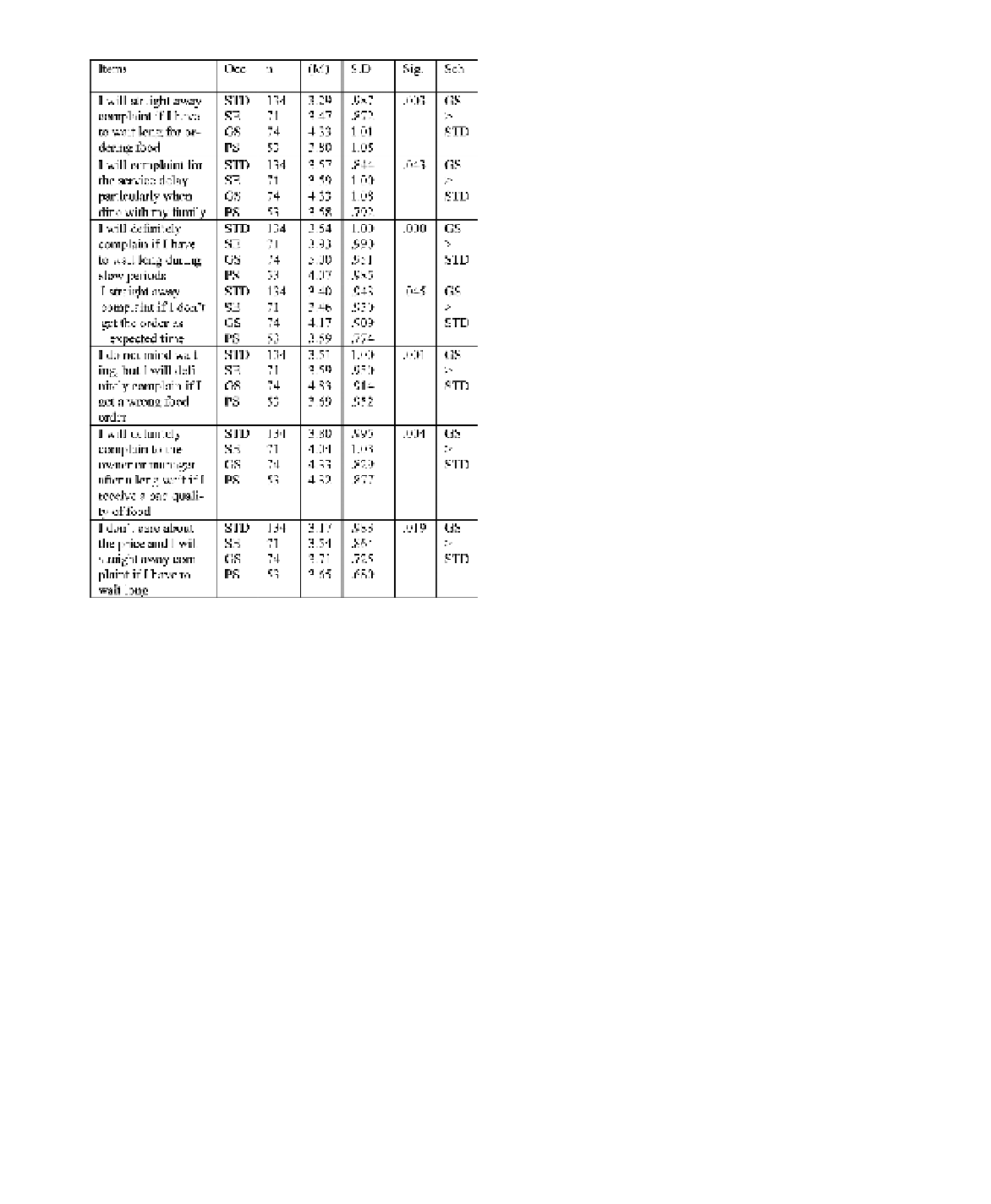Travel Reference
In-Depth Information
Table 2. Showing the items from the data collection
where statistically significant differences between 'occu-
pations 'were identified.
bad experience and the Government Servants (GS)
are found to be more aggressive than the Students
(STD). This is evident when Government Servants
(GS) strongly reported themselves as somewhat
agreeing that they will straight away complaint if
they have to wait long for food ordering (M
=
4.33,
p
=
.003, compared M
=
3.29, M
=
3.47 and
M
3.80), especially when dine with their fam-
ily (M
=
=
4.33, p
=
.043 opposed to M
=
3.57,
M
3.58). Most government serv-
ants expressed that will definitely complain if they
had to wait too long for their meals, especially dur-
ing slow periods (M
=
3.59 and M
=
=
5.00, p
=
.000) compared to
student (M
=
3.54), self-employed M
=
3.93) and
private sector employees (M
4.07), if they do not
get the order as expected time (M
=
=
4.17, p
=
.045
opposed to M
=
3.40, M
=
3.46 and M
=
3.59) and
get a wrong food order (M
=
4.83, p
=
.001 com-
pared to M
3.69). Further,
they also will definitely complain if they have to
wait too long for a simple food (M
=
3.51, M
=
3.59 and M
=
=
4.67, p
=
.000
compared to M
=
3.66, M
=
4.13 and M
=
4.26)
and don't care about the price (M
=
3.71, p
=
.019,
compared M
3.65).
Despite these differences, the mean scores given
by four occupational groups are in the same mag-
nitudes which are mostly agreeing with the state-
ment. These results suggest that although the
government servant is more aggressive the other
three occupational groups will also be impatient if
they have to wait long beyond expected time when
dining at the Gerai.
=
3.17, M
=
3.54 and M
=
Note:
1. Any significant differences are indicated by
being bolded
2. Inter groups differences are based on Scheffé
procedure.
3. STD (Student), SE (Self Employment), GS (Govern-
ment Servant) and PS (Private Sector)
5
IMPLICATIONS AND CONCLUSION
It is evident from this study that both males and
females appear to be sensitive to service delays or
too long waiting. Both genders do not care about
the price but will start grumbling, get angry, espe-
cially for a simple food and when they dine with
their family if they have to wait too long for the
ordering food. Males and females Gerai customers
will definitely complain if they get a wrong food
order receive bad quality and have to wait long
during the slow period. Both genders also share
similar feelings that they may lose their mood of
dining, do not feel like spending, demand for com-
pensation and walk out from the Gerai in a worst
case scenario.
On the occupation, although intolerant with
too long waiting or service delay and likely to
react negatively by not revisiting, the government
servants are found to be more aggressive than the
students, private sector employee and the self-em-
ployed individuals with regard to complaints.
With these indicators Gerai operators therefore
should not overlook these negative perceptions
The overall findings indicate there is no convinc-
ing evidence to believe that the reaction towards
service delay of male differ than female respond-
ents. Both genders have a common reaction and
attitudes toward the too long waiting and service
delay.
4.3
Comparison of complaint behavior based
customer occupation
One-way ANOVA and Scheffe post hoc multiple
comparison test were applied to identify an item
that has significant differences in complaints
behavior between customer occupations. Only
those items with statistically significant differences
are reported in Table 2.
By means of a Scheffé multiple comparison test,
most of the differences found between the govern-
ment servants (GS) and students (STD) compared
to self-employed (SE) and private sector employees
(PS). The result showed that a service delay is a




Search WWH ::

Custom Search